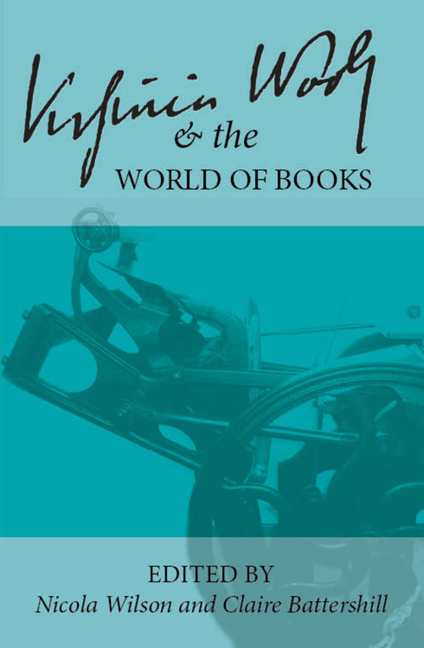 Virginia Woolf and the World of Books
Virginia Woolf and the World of Books Book contents
- Frontmatter
- Contents
- Introduction
- List of Abbreviations
- Keynote
- In the Archives
- Craftsmanship
- The Hogarth Press
- Hours in A Library
- The Art of the Book
- The Art of the Narrative
- Making New Books: Creative Approaches
- The Book in the World: Woolf's Global Reception
- Editing and Teaching Woolf
- Learning Through the (Digital) Archive: Notes on Undergraduate Research
- Editing Woolf
- Intertextuality
- Lives in Writing
- Notes on Contributors
Editing Woolf
from Editing and Teaching Woolf
- Frontmatter
- Contents
- Introduction
- List of Abbreviations
- Keynote
- In the Archives
- Craftsmanship
- The Hogarth Press
- Hours in A Library
- The Art of the Book
- The Art of the Narrative
- Making New Books: Creative Approaches
- The Book in the World: Woolf's Global Reception
- Editing and Teaching Woolf
- Learning Through the (Digital) Archive: Notes on Undergraduate Research
- Editing Woolf
- Intertextuality
- Lives in Writing
- Notes on Contributors
Summary
I will put my cards on the table—I never wanted to edit a Companion—to Virginia Woolf or any other writer. In fact, companions scare me. They create the appearance of coverage or the definitive word on any particular topic or subject. The very notion of a “companion” presumes familiarity, comradery, or friendship—or at least the prospect of these relations. Handbooks, even at their most perspicacious, invite us to think the topic can be made ready “to hand,” and often must find ways to make that possible—excising the unfamiliar, the far flown, or the foreign. The Cambridge Companion to Modernism, admittedly, a 1999 volume updated more than five years ago, barely ventures outside Anglo-American writing, except by reference to Picasso, Freud, Marx, et al., and rarely moves outside of the period between the last decade of the 19th century and WWII. I wonder, what happens to a writer like Gustave Flaubert in these models— or that painter of modern life, Charles Baudelaire? What happens to the writers in the colonies, whose lack of access to cultural and economic power often means they don't “do” modernism or modernity until the second half of the century? In an effort to make these volumes less about traditional categories of coverage, Cambridge has begun to issue companions that look more like conventional essay collections, such as The Cambridge Companion to Literature and the Posthuman, or a recent one I've contributed to: The Cambridge Companion to Transnational American Literature. This is a good impulse, but it is hard to know why these should still be called “companions,” when those are, by their own definition, “a series of authoritative guides, written by leading experts, offering lively, accessible introductions to major writers, artists, philosophers, topics, and periods.” Not to pick on Cambridge—Wiley Blackwell has also started to make more topical and less generic companions, like the Feminist Companion to Shakespeare, now in its second edition. This looks like a terrific book, with a whole section on “Race and Colonialism,” and another on “Performing Sexuality.” But I fear that companions are crowding out other work in the field, making it harder to publish groundbreaking monographs or other adventurous work that doesn't purport to provide a general overview.
- Type
- Chapter
- Information
- Virginia Woolf and the World of BooksSelected Papers from the Twenty-seventh Annual International Conference on Virginia Woolf, pp. 241 - 252Publisher: Liverpool University PressPrint publication year: 2018
